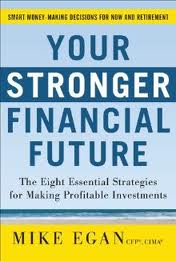This is a guest post by Mike Egan who is the author of “Your Stronger Financial Future”.
A recent article in the New York Times focuses on seniors who are considering mortgages on new homes when they retire. The article is a good summary of what seniors (or anyone considering a mortgage application) should expect and the specific items to have handy, such as proof of income and a good credit score. Of course, it goes without saying that you can’t rely on property to see you through retirement, and it’s wise to also look at a deferred annuity so you have all your bases covered. With that said, let’s continue so you can find out more about potentially having a mortgage when you retire.
What the article doesn’t address is the question of whether a mortgage is a good idea, either for a senior (65 and older) or anyone else. Think about this – no matter what the term of the home loan, or mortgage, you’ll be paying interest to the lender, plus repaying the principal (the $$ you borrowed) for some period of time.
Home mortgages and student loans are the two main examples of what I call “good debt” – which are loans that result in you owning something of value at the end. So, given that a mortgage generally results in you owning the house or condo when you’ve paid back the loan, let’s examine the math involved in a home mortgage.
For a standard 30-year mortgage, you’ll make 360 payments (30 years x 12 months) of both principal and interest. In the beginning, the vast majority (77.61%) of the payment you make to the bank is interest. Only a tiny amount is a repayment of the $$ you borrowed. Gradually as you pay down the principal balance, the monthly payment gets more balanced, reaching approximately 50% interest and 50% principal in year 17.
When you are very close to the end of the mortgage term, your payment will be almost completely principle, since you won’t owe that much more back and so the interest charges, based on that lower principal balance, are very low. Another item to consider is that a $250,000 mortgage will actually cost $483,139.46 over the entire term*, which consists of $233,139.46 in interest, plus the original $250,000 you borrowed.
What if instead, you selected a 5 year or 7 year mortgage? The idea is the same – you buy the house with some percentage of your own money and the remainder from the lender. You make monthly payments of principal and interest and eventually own the home after you’ve made all of the payments. But in the case of a 5 year home loan, payments automatically go to over 50% of your principal in year 1 (77.92% is paid towards principal).
At that point, you’re on the way to paying less and less interest and more and more principal, racing towards full home ownership. That same $250,000 mortgage that costs $483,139.46 in total for 30 years only costs $283,068.50 for 5 years*, a savings in interest costs of $200,070.96!
Good debt includes mortgages, but your choice of how long to borrow can have a very large effect on your retirement savings!
What would it look like for you to explore the idea of a 5 or 7 year home mortgage?
Mike Egan, a 20-year Wall Street veteran, is on a mission to help Americans unleash the power within them to build a stronger financial future. He is the author of “Your Stronger Financial Future” and a blogger at MacroMike.com.


Personally, I don’t think having any debt during retirement is a good idea. That is my first requirement before retiring–making sure all of my debt is paid off. Then I will focus on making sure I have enough saved and enough income.
Debt during retirement is not worth it to me… I suppose the exception would be if a person only has their property as their main retirement asset.